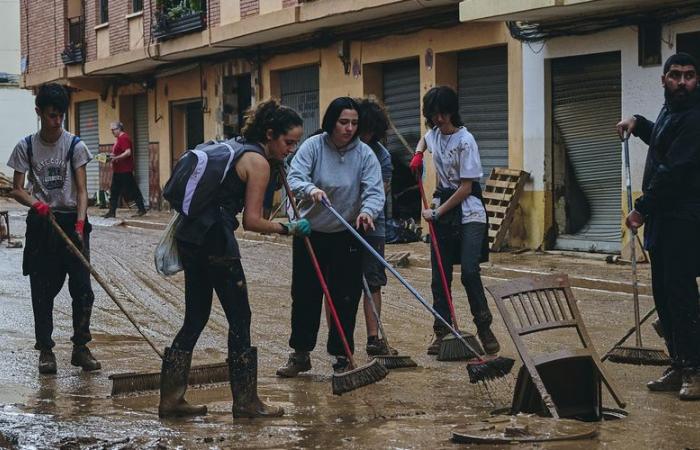
Four days after the tragic floods which devastated the south-east of Spain, new military reinforcements arrived on Saturday November 2 to help search for the missing and restore the areas ravaged by torrents of mud.
The latest report given Friday evening by the authorities shows at least 211 victims, including 204 in the Valencia region, the most affected by these spectacular bad weather. Two other people died in Castile-la-Mancha and a third in Andalusia.
But this toll could rise further, with many missing people still being sought, particularly in the carcasses of cars overturned by the raging waves, which litter the parking lots and streets.
The president of the Valencia region, Carlos Mazón, assured Friday evening that there was still no official figure concerning those missing, while residents without news of their loved ones increased their calls for help. help on social networks.
“It would be imprudent to give a figure”Interior Minister Fernando Grande-Marlaska confirmed on the Antena 3 television channel. Nevertheless, “it is likely, given the circumstances and the feedback from experts, that there will be more deaths”he clarified.
To deal with this situation, Spanish Prime Minister Pedro Sanchez announced the sending of 10,000 additional soldiers and police officers.
Solidarity
One of the army's priorities, in addition to the search for the missing, is to reopen the roads to allow the delivery of aid, particularly food, by clearing vehicles and rubble which prevent circulation, and to restore the order in the affected municipalities.
Since the floods, which occurred during the night from Tuesday to Wednesday, the authorities have noted acts of looting and theft. The police announced that they had already arrested several dozen people, several of whom were placed in pre-trial detention.
The outpourings of solidarity continue, particularly in Valencia, where thousands of people gathered for the second consecutive day on Saturday at dawn to go on foot to neighboring towns, equipped with shovels and brooms, according to a journalist. of the‘AFP.
“Yesterday we brought tons of food and water to the most affected municipalities,” assured journalists Susana Camarero, vice-president of the Valencia region, recognizing that operations were hampered by the state of infrastructure
“Many villages were isolated and we called local councils to find out what they needed, but there were no phones”she recalled, while thousands of people remain deprived of communications.
“The aid is insufficient. Fortunately, Spain knows how to show solidarity”confided to l'AFP Alicia Izquierdo, who came on Friday to bring two carts full of food with her sister Marta to their brother's house in Paiporta, a town of more than 25,000 inhabitants where at least 62 deaths have been recorded.
On Friday, the number of volunteers was such that the authorities called on residents going by car to the affected communities to stay at home, so as not to clog the roads and prevent the passage of help.
In the suburbs of Valencia, the work of rescuers and soldiers should take place under mild skies on Saturday. But the National Meteorological Agency (Aemet) warned that heavy rainfall would still occur in the province of Castellon, in the north of the Valencia region, placed on orange alert.





